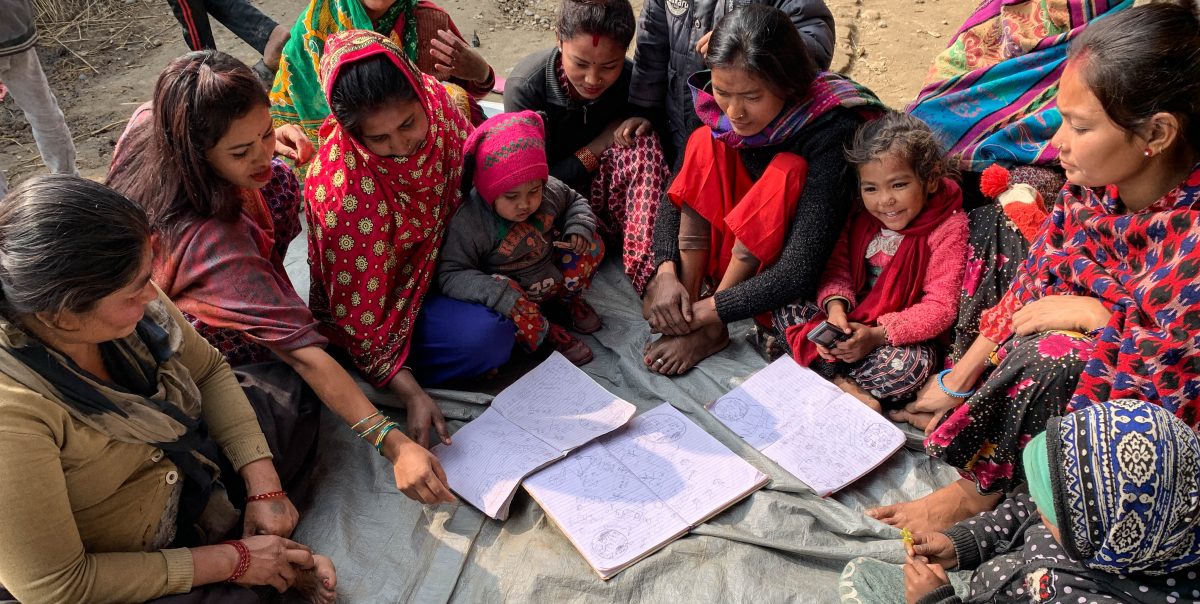This blog page is authored by Tribhuban Paudel with support from Linda Mayoux. It is sponsored by IFAD and supported by the implementing team in Nepal, including Tribhuban Paudel, and serves as a resource hub for deepening and upscaling GALS in IFAD programmes across Nepal. For further details please contact Tribhuban on Linked-In.
The Gender Action Learning System (GALS) tools were first introduced in Nepal by Linda Mayoux in 2006 as part of an impact assessment of the PACT-US microfinance programme.
!! Linda to insert photos and IA report download link

IFAD JP-RWEE
In 2019, GALS was adopted as a full process by IFAD through the Joint Programme on Rural Women’s Economic Empowerment (JP-RWEE), jointly implemented by FAO, IFAD, WFP, and UN Women. Between 2019 and 2021, a total of 1,569 rural self-help group members (1,020 women and 549 men) in Rautahat and Sarlahi districts learned to apply the GALS methodology and its basic tools and practice the Happy Family Review.
Building on the positive experience and results, GALS was scaled up in the IFAD-funded Samriddhi – Rural Enterprises and Remittance Project (RERP), implemented by the Ministry of Industry, Commerce, and Supplies in seven districts of Madhesh Province from 2020. By 2024, GALS had reached 1,668 households, where entire families engaged in joint planning, set collective goals, and actions, implemented jointly and realized the changes together. These efforts have generated inspiring success stories of women’s and men’s empowerment, as well as community-wide transformation.
The approach was further expanded in the IFAD-funded Agriculture Sector Development Project (ASDP), implemented by the Ministry of Agriculture and Livestock Development in five districts of Karnali Province since 2022. From 2025, LI-BIRD, in partnership with Oxfam Nepal, is also rolling out GALS, while WFP has already adapted the methodology in its maternal and child health programmes.
The methodology has proven transformative approach- helping rural women build self-esteem, strengthen planning and decision-making, and foster cooperation within households. Families practicing GALS report improved relationships, diversified livelihood options, enhanced incomes, and greater overall well-being. Importantly, GALS exercises have encouraged family members to reflect on their aspirations, behaviours, and actions, inspiring both women and men to adopt more equitable roles and actively pursue their shared goals.
Business Action Learning for Innovation (BALI) is started to implement in JP-RWEE II from 2025 in 2 districts of Madesh Province. GALS is also being integrated in Financial Education and Business Literacy (FEBL) and being implemented at group level.













Photos and text by Tribhuban Paudel.

Training Resources
for on-line training by Linda Mayoux !! Links to be updated
Session 1: Friday: Overview of available GAMEChange Methodologies and Toolkits.
Session 2: Monday
Life Planning
Change Journeys
Soulmate Visioning Process:
https://gamechangenetwork.org/wp-content/uploads/2017/08/SNVPALS_Tool1_SoulmateVisioning.pdf
Vision Journey:
https://gamechangenetwork.org/wp-content/uploads/2017/08/SNVPALS_Tool2_VisionJourney.pdf
Session 3: Tuesday
Gender, Happy Family and
Challenge Action Trees
Happy Family Tree
Challenge Action Tree
Session 4: Thursday Leadership, Upscaling and Sustainability: Empowerment Maps
Change Leadership Map

